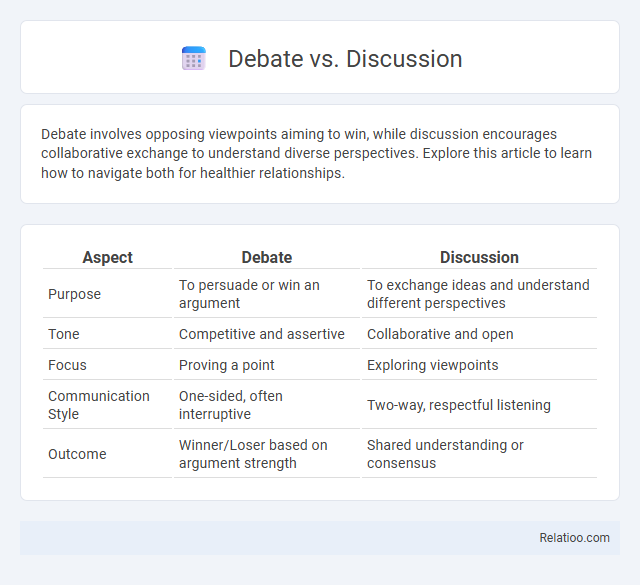Debate involves opposing viewpoints aiming to win, while discussion encourages collaborative exchange to understand diverse perspectives. Explore this article to learn how to navigate both for healthier relationships.
Table of Comparison
| Aspect | Debate | Discussion |
|---|---|---|
| Purpose | To persuade or win an argument | To exchange ideas and understand different perspectives |
| Tone | Competitive and assertive | Collaborative and open |
| Focus | Proving a point | Exploring viewpoints |
| Communication Style | One-sided, often interruptive | Two-way, respectful listening |
| Outcome | Winner/Loser based on argument strength | Shared understanding or consensus |
Understanding Debate and Discussion
Debate emphasizes structured argumentation where participants defend opposing viewpoints to persuade an audience, while discussion encourages collaborative communication aimed at sharing ideas and exploring different perspectives for mutual understanding. Understanding the distinction between debate and discussion helps you engage effectively by choosing when to advocate assertively or when to listen openly and exchange information. Mastering both approaches enhances your ability to navigate conversations productively in personal and professional settings.
Key Differences Between Debate and Discussion
Debate involves structured argumentation where participants aim to persuade an audience by presenting opposing viewpoints, often characterized by a competitive tone and clear winners or losers. Discussion, in contrast, emphasizes open exchange of ideas with the goal of mutual understanding or problem-solving, fostering collaboration rather than competition. Key differences include the debate's focus on winning versus the discussion's focus on consensus, and the formal rules governing debate compared to the more flexible and informal nature of discussion.
Purpose and Objectives of Each Format
Debate aims to persuade an audience by presenting structured arguments and counterarguments, focusing on winning or proving a point, whereas discussion seeks collaborative exploration of ideas to reach mutual understanding or solutions. Disagreement highlights conflicting viewpoints without necessarily resolving differences, often emphasizing the recognition of contrasting opinions rather than consensus. Understanding these distinctions helps you choose the appropriate format based on whether your goal is to convince, collaborate, or simply acknowledge opposing perspectives.
Communication Styles in Debate vs Discussion
Debate features a competitive communication style where participants aim to persuade an audience by presenting structured arguments and rebuttals, emphasizing winning over mutual understanding. Discussion adopts a collaborative communication approach focused on exchanging ideas openly to reach common ground or shared insights without the pressure of victory. Disagreement involves expressing opposing viewpoints, which can occur in both debates and discussions but lacks the structured format and goal-oriented nature of debates.
Structure and Rules: Debate vs Discussion
Debate follows a strict structure with formal rules including timed speaking turns, a clear resolution, and roles such as affirmative and negative teams, ensuring organized argument presentation and rebuttal. Discussion is more flexible, allowing open dialogue, free-flowing exchange of ideas, and collaborative problem-solving without rigid time limits or defined opposing sides. The regulated format in debates emphasizes winning the argument, whereas discussions prioritize mutual understanding and consensus-building.
The Role of Emotion and Logic
Debates emphasize logical argumentation, often prioritizing structured evidence and reasoning to persuade an audience, while emotions can intensify engagement but must be managed to maintain clarity. Discussions balance emotion and logic by encouraging open communication and understanding among participants, allowing your ideas to be shared and refined collaboratively. Disagreements arise when emotional responses overshadow logical analysis, which may hinder resolution but also highlight deeply held values and perspectives.
Outcomes and Resolutions
Debates aim to prove a point through structured argumentation, often resulting in a winner rather than consensus, whereas discussions prioritize sharing perspectives to reach mutual understanding and collaborative resolutions. Disagreements highlight conflicting viewpoints that may require negotiation or compromise to resolve, impacting the effectiveness of decision-making processes. Your ability to recognize the nature of the interaction helps tailor communication strategies for clearer outcomes and more constructive resolutions.
Benefits and Drawbacks of Debates
Debates promote critical thinking by encouraging participants to defend their viewpoints with evidence, enhancing persuasive communication skills. However, debates can sometimes foster a competitive atmosphere that prioritizes winning over understanding, potentially escalating conflicts. Despite this, debates remain effective for clarifying diverse perspectives and sharpening argumentative abilities.
Advantages of Productive Discussions
Productive discussions enhance collaboration by encouraging open communication and diverse perspectives, leading to well-rounded solutions. You benefit from increased understanding and stronger relationships as trust builds through respectful exchanges of ideas. This approach fosters innovation and prevents conflicts from escalating into unproductive disagreements.
Choosing the Right Approach for Effective Communication
Choosing the right approach between debate, discussion, and disagreement depends on the communication goal and context. Debates emphasize persuasion and winning arguments, suitable for competitive or formal settings, while discussions foster collaborative exploration of ideas, ideal for problem-solving and consensus-building. Disagreements focus on contrasting views that may require conflict resolution strategies to maintain respect and understanding in effective communication.

Infographic: Debate vs Discussion
 relatioo.com
relatioo.com